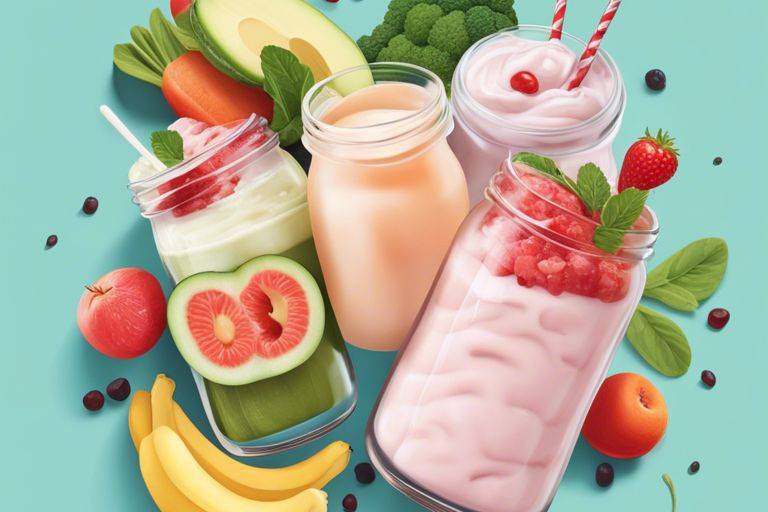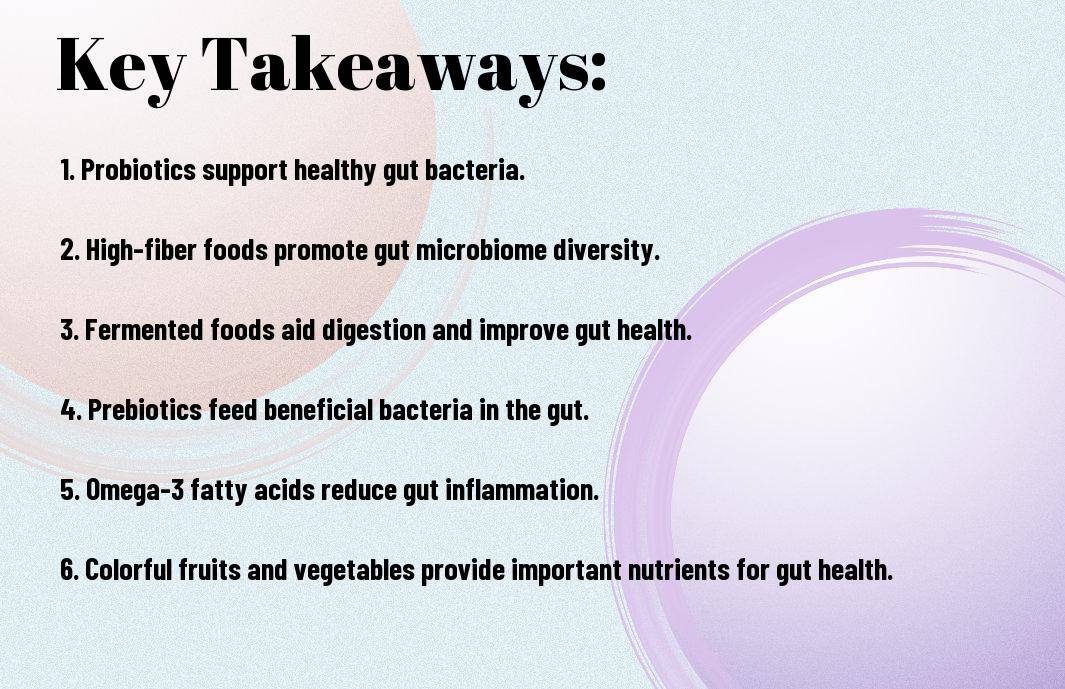
Newsletter Subscribe
Enter your email address below and subscribe to our newsletter

Enter your email address below and subscribe to our newsletter

You are what you eat, especially when it comes to your gut health. Maintaining a healthy gut is crucial for overall well-being, as it is linked to immunity, mental health, and even weight management. In this article, I will share some top foods that can help you improve your gut health and promote a thriving digestive system. Incorporating these foods into your diet can make a significant difference in how you feel both inside and out.


For me, understanding the gut-brain connection has been eye-opening. Did you know that the gut and the brain are in constant communication through a network called the gut-brain axis? This means that the state of your gut can directly impact your mental health and cognitive functions. Maintaining a healthy gut is crucial not just for your physical well-being but also for your mental well-being.
One of the most fascinating aspects of gut health is its profound impact on overall well-being. Your gut health plays a key role in your immune system, digestion, nutrient absorption, and even your mood. Research has shown that an imbalance in gut bacteria can contribute to a range of health issues, including digestive problems, autoimmune diseases, and even mental health disorders.
It is necessary to prioritize gut health by consuming a diverse range of fibrous foods, fermented foods, and staying hydrated to support a healthy gut microbiome. By nourishing your gut, you are investing in your overall health and well-being. Recall, a happy gut leads to a happier and healthier you!
Even if you’re not a fan of sauerkraut’s tangy taste, I encourage you to give it a try for the sake of your gut health. **Sauerkraut** is a **probiotic powerhouse**, rich in beneficial bacteria that support a healthy gut microbiome.
With its spicy kick and umami flavor, **kimchi** is not only a delicious addition to your meals but also a potent **fermented food** for gut health. Incorporating **kimchi** into your diet can introduce a variety of beneficial bacteria for a thriving gut.
An **crucial part of Korean cuisine**, **kimchi**, is made from fermented vegetables, usually cabbage and radishes, seasoned with garlic, ginger, and red pepper flakes. This spicy dish is not only tasty but also packed with beneficial probiotics that can enhance your gut health. **Including kimchi** in your diet can diversify your gut microbiome and potentially improve your overall digestion and immune function.
For a savory and **umami-rich flavor**, look no further than **miso**. This **fermented soybean paste** offers more than just taste; it is a **powerhouse of probiotics** that can benefit your gut health.
**Miso**, commonly used in Japanese cuisine, is made by fermenting soybeans with salt and a fungus called koji. This fermentation process not only enhances the flavor but also creates beneficial bacteria that can support your digestive system. **Incorporating miso** into soups, dressings, or marinades can introduce **health-boosting probiotics** to your gut, promoting a happy and balanced microbiome.
Despite the myriad of fad diets out there, one thing remains constant: fiber-rich foods are vital for good gut health. If you want to boost your digestive system, incorporating foods high in fiber is crucial. To learn more about foods to eat to improve your gut health, check out Food to Eat to Improve Your Gut Health – Covington Hospital.
With their high fiber content and abundance of vitamins and minerals, leafy greens are the ultimate gut-friendly food. Foods like spinach, kale, and Swiss chard not only promote healthy digestion but also help maintain a diverse gut microbiome, which is vital for overall well-being.
Any legumes, such as beans, lentils, and peas, are excellent sources of fiber and protein that can support a healthy gut. These plant-based foods help feed the good bacteria in your gut, promoting better digestion and reducing inflammation.
For instance, black beans, chickpeas, and split peas are not only rich in fiber but also contain prebiotics that nourish the beneficial bacteria in your gut. By including a variety of legumes in your diet, you can improve your gut health and overall well-being.
On top of providing a good source of fiber, whole grains like brown rice and quinoa also offer vital nutrients that support gut health. These grains are packed with vitamins, minerals, and antioxidants that help maintain a balanced gut microbiome and promote healthy digestion.
It’s important to choose **whole grains** over refined grains, as the latter can **negatively impact** your gut health. By incorporating whole grains into your diet, you can **nourish your gut** and support **optimal digestive function**.

On my journey to improve my gut health, I discovered the benefits of omega-3 fatty acids found in fatty fish like salmon, sardines, and mackerel. These fish are not only delicious but also rich in omega-3, which can help reduce inflammation in the gut and support a healthy digestive system.
Any time you’re looking to boost your omega-3 intake, reach for walnuts, chia seeds, or flaxseeds. These nutritious gems are packed with omega-3 fatty acids, fiber, and antioxidants that promote gut health and overall well-being.
Seeds like chia and flax are fantastic sources of plant-based omega-3, making them perfect for vegetarians and vegans looking to support their gut health. These tiny powerhouses can easily be added to smoothies, salads, or oatmeal for a delicious and nutritious boost.
On my path to a healthier gut, I’ve come to appreciate avocados not only for their creamy texture but also for their gut-friendly benefits. Avocados are rich in healthy fats and fiber, which can help nourish the gut microbiome and support digestion.
Fish like salmon, sardines, and mackerel are not only delicious but also rich in omega-3 fatty acids, which are necessary for reducing inflammation in the gut and promoting overall gut health. Including these fatty fish in your diet can benefit your digestive system and contribute to a healthier gut microbiome.

To boost your gut health, include an assortment of berries like blueberries, strawberries, and raspberries in your diet. Berries are rich in polyphenols, which are powerful antioxidants that help protect your gut from inflammation and oxidative stress. Additionally, they are delicious and can be easily incorporated into smoothies, yogurt, or as a topping for oatmeal.
Another fantastic way to support your gut health is by incorporating green tea into your daily routine. Green tea contains polyphenols that can promote the growth of beneficial gut bacteria, aiding in digestion and overall gut health. Enjoy a warm cup of green tea in the morning or sip on some iced green tea throughout the day to reap the benefits.
Polyphenol-Rich foods like green tea are not only delicious but also provide a plethora of health benefits for your gut. By regularly consuming polyphenol-rich foods, you can improve your gut microbiota diversity and enhance overall digestive function.
Dark chocolate is not only a tasty indulgence but also a gut-friendly treat. Opt for dark chocolate with at least 70% cocoa content to reap the benefits of polyphenols. These compounds can help reduce inflammation in the gut and support the growth of beneficial gut bacteria. Indulge in a square or two of dark chocolate as a guilt-free way to boost your gut health.
Delicious and decadent, dark chocolate is a delightful way to support your gut health while satisfying your sweet tooth. Remember to choose high-quality dark chocolate with minimal added sugars to maximize its polyphenol content and reap the gut-healing benefits.
All How to Improve and Reset Gut Health days, I focus on incorporating a variety of foods that promote a healthy gut. Apart from the usual suspects like fruits and veggies, there are a few other gut-friendly foods that I regularly include in my diet. These foods can help improve digestion, boost immunity, and enhance overall gut health.
GutFriendly bone broth is a powerhouse of nutrients that can work wonders for your gut health. It is rich in collagen, gelatin, amino acids, and minerals that support gut lining integrity, reduce inflammation, and aid in digestion. Including bone broth in your diet can help heal and seal your gut, promoting overall digestive wellness. A warm cup of bone broth can be soothing, nourishing, and incredibly beneficial for your gut.
To boost your gut health, incorporating yogurt into your daily diet can be a game-changer. Yogurt is packed with probiotics, the good bacteria that promote a healthy gut microbiome. These live cultures help balance the gut flora, improve digestion, and strengthen the immune system. Choose plain, unsweetened yogurt for maximum benefits and enjoy it as a snack, in smoothies, or as a topping for your favorite dishes.
Yogurt contains high levels of calcium, protein, and crucial vitamins like B12 and riboflavin. These nutrients not only support gut health but also contribute to overall well-being. Opt for Greek yogurt for an extra protein punch or explore dairy-free options like coconut or almond yogurt if you’re lactose intolerant.
NutrientRich ginger is a potent anti-inflammatory spice that can benefit your gut health in many ways. It helps alleviate digestive issues like bloating, gas, and indigestion by reducing inflammation in the gut. Ginger also aids in nutrient absorption, promotes healthy gut motility, and supports a balanced gut microbiome. Adding fresh ginger to your meals, smoothies, or tea can not only enhance the flavor but also provide powerful gut-nourishing benefits.
The active compound in ginger, gingerol, is responsible for its anti-inflammatory and antioxidant properties. This makes ginger a valuable ingredient for soothing gastrointestinal discomfort and promoting gut healing. Whether you grate it, slice it, or juice it, incorporating ginger into your diet can be a flavorful way to support your gut health.
As a reminder, prioritizing foods that support gut health is crucial for overall well-being. Incorporating items like yogurt, salmon, and almonds into your diet can positively impact your digestive system and immune function. To learn more about 15 foods that can benefit your gut health, check out 15 Foods For Good Gut Health. Your gut will thank you!
A: Some top foods to boost gut health include fermented foods like yogurt, kefir, and kimchi, as well as high-fiber foods such as legumes, fruits, and vegetables.
A: Fermented foods contain probiotics, which are beneficial bacteria that can help maintain a healthy balance of gut flora and improve digestion.
A: Fiber helps feed the beneficial bacteria in the gut, promoting a healthy gut environment and regular bowel movements.
A: Yes, fruits like bananas, apples, and berries are particularly good for gut health due to their high fiber content and ability to support the growth of beneficial gut bacteria.
A: Whole grains like oats, quinoa, and brown rice are rich in fiber, vitamins, and minerals that support a healthy gut microbiome and overall digestive health.
A: Prebiotic foods, such as garlic, onion, and leeks, contain fibers that help feed the beneficial bacteria in the gut, promoting their growth and improving gut health.
A: Yes, a diet high in processed foods and low in fiber can disrupt the balance of gut bacteria and lead to digestive issues, inflammation, and other gut health problems.